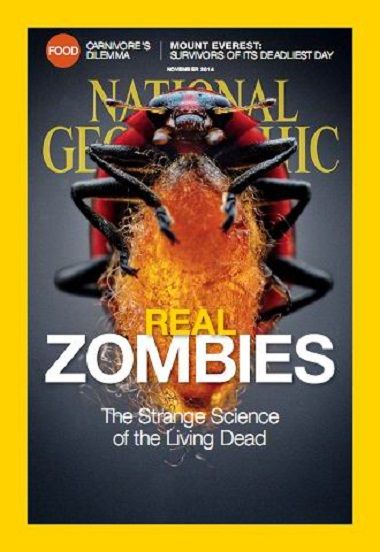Mind Controlling Parasites of Nature
 Scientific
research can read like a horror story when the subject is parasites.
There are numerous parasite species that not only feed on their victims,
but actually start to control their victim’s behavior for their own
ends. In effect, the parasite is exerting mind control to turn the
victim into a zombie slave. That’s a standard horror film plot right
there. Carl Zimmer wrote the cover article for the new issue of National Geographic magazine, in which he gives us plenty of creepy examples from nature.
Scientific
research can read like a horror story when the subject is parasites.
There are numerous parasite species that not only feed on their victims,
but actually start to control their victim’s behavior for their own
ends. In effect, the parasite is exerting mind control to turn the
victim into a zombie slave. That’s a standard horror film plot right
there. Carl Zimmer wrote the cover article for the new issue of National Geographic magazine, in which he gives us plenty of creepy examples from nature.Frederic Libersat of Ben-Gurion University and his colleagues, for example, are dissecting the sinister attacks of the jewel wasp, Ampulex compressa. The wasp stings a cockroach, transforming it into a passive zombie. The wasp can then walk its drugged victim into a burrow by the roach’s antenna, like a dog on a leash. The roach is perfectly capable of movement. It just lacks any motivation to move on its own behalf. The wasp lays an egg on the roach’s underside, and the roach simply stands there as the wasp larva emerges from the egg and digs into its abdomen.This is just one of many species that take over their victim’s brain, instincts, and behavior. Read about more of these parasites, as well as the research about them, in the NatGeo article Mindsuckers.
What is the secret hold that the wasp has over its victim? Libersat and his colleagues have found that the wasp delicately snakes its stinger into the roach’s brain, sensing its way to the regions that initiate movements. The wasp douses the neurons with a cocktail of neurotransmitters, which work like psychoactive drugs. Libersat’s experiments suggest that they tamp down the activity of neurons that normally respond to danger by prompting the cockroach to escape.

No comments:
Post a Comment